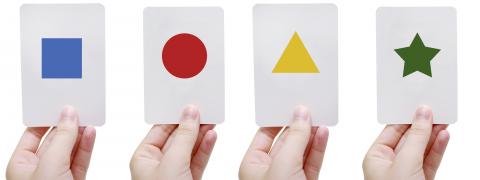Adjectives are essential to every Greek learner, since they can describe the features and attributes of everything around us. In this blog post, GreekPod101.com aims to present you with a full list of all the basic adjectives you can use, in order to accurately describe all the objects or people that surround you.
When it comes to adjectives in Greek grammar, there are many suffixes that Greek adjectives may have depending on the gender of the noun they define. Usually, the Greek adjectives’ endings are:
- -ς or -ων if they are masculine
- -η / -α / -ού if they are feminine
- -ο / -ί / -ύ / -ες / -ον if they are neuter
This is a generic rule for how to conjugate Greek adjectives, although there can be some exceptions. For example, adjectives that are common for the masculine and feminine gender, such as the ones ending in -ης or -ων.
From a syntax perspective (Greek adjective placement), adjectives in Greek are usually placed before the noun they describe, like in English. They can also follow the noun in some cases. However, that’s less common, and they need to be preceded by the definite article in such cases.
Now that we have the basics out of the way, we can start to learn Greek adjectives and move on to our modern Greek adjectives list!
Table of Contents
- Describing Dimensions, Sizes, Weight & Distance
- Describing Value
- Describing Feeling & Sense
- Describing Personality Traits & Human Behavior
- Describing Speed, Difficulty & Importance
- Describing Colors
- Describing Shapes & Textures
- Describing the Weather
- Describing Taste
- Describing a Situation
- Describing a Physical Trait or a Physical Condition
- Describing Appearance or Condition
- Conclusion
1. Describing Dimensions, Sizes, Weight & Distance
Let’s start with the most common Greek adjectives: those that describe things like dimensions and distance!
- μεγάλος (megálos) – “big”
- μικρός (mikrós) – “small”
Example:
Greek: Αυτό είναι ένα μεγάλο / μικρό κουτί.
Romanization: Aftó íne éna megálo / mikró kutí.
Meaning: “This is a big / small box.”
- φαρδύς (fardís) – “wide”
- στενός (stenós) – “narrow”
Example:
Greek: Ο δρόμος είναι φαρδύς / στενός.
Romanization: O drómos íne fardís / stenós.
Meaning: “The road is wide / narrow.”
- ψηλός (psilós) – “tall”
- κοντός (kondós) – “short”
Example:
Greek: Αυτό είναι ένα ψηλό / κοντό δέντρο.
Romanization: Aftó íne éna psiló / kondó dédro.
Meaning: “This is a tall / short tree.”
- βαρύς (varís) – “heavy”
- ελαφρύς (elafrís) – “light”
Example:
Greek: Η καρέκλα είναι βαριά / ελαφριά.
Romanization: I karékla íne variá / elafriá.
Meaning: “The chair is heavy / light.”
- κοντινός (kondinós) – “close”
- μακρινός (makrinós) – “far”
Example:
Greek: Η Ελλάδα είναι ένας κοντινός / μακρινός προορισμός.
Romanization: I Eláda íne énas kondinós / makrinós proorizmós.
Meaning: “Greece is a close / far away destination.”
2. Describing Value
- καλός (kalós) – “good”
- κακός (kakós) – “bad”
- εξαιρετικός (exeretikós) – “exceptional”
- απαίσιος (apésios) – “awful”
- μέτριος (métrios) – “mediocre”
Example:
Greek: Αυτό το εστιατόριο είναι καλό / κακό / εξαιρετικό / απαίσιο / μέτριο.
Romanization: Aftó to estiatório íne kaló / kakó / ekseretikó / apésio / métrio.
Meaning: “This restaurant is good / bad / exceptional / awful / mediocre.”
3. Describing Feeling & Sense
- κρύος (kríos) – “cold”
- ζεστός (zestós) – “warm”
- καυτός (kaftós) – “hot”
- παγωμένος (pagoménos) – “frozen”
Example:
Greek: Ο καφές μου είναι κρύος / ζεστός / καυτός / παγωμένος.
Romanization: O kafés mu íne kríos / zestós / kaftós / pagoménos.
Meaning: “My coffee is cold / warm / hot / frozen.”
- μαλακός (malakós) – “soft”
- σκληρός (sklirós) – “hard”
Example:
Greek: Το ψωμί είναι μαλακό / σκληρό.
Romanization: To psomí íne malakó / skliró.
Meaning: “The bread is soft / hard.”
- ανώδυνος (anódinos) – “painless”
- επώδυνος (epódinos) – “painful”
Example:
Greek: Αυτή η επέμβαση είναι ανώδυνη / επώδυνη.
Romanization: Aftí i epémvasi íne anódini / epódini.
Meaning: “This procedure is painful / painless.”
4. Describing Personality Traits & Human Behavior
Positive Traits
- καλός (kalós) – “good”
- ευγενικός (evyenikós) – “kind”
- φιλικός (filikós) – “friendly”
- χαρούμενος (harúmenos) – “happy”
- αστείος (astíos) – “funny”
Example:
Greek: Η γυναίκα του είναι καλή / ευγενική / φιλική / χαρούμενη / αστεία.
Romanization: Ι ginéka tu íne kalí / evyenikí / filikí / harúmeni / astía.
Meaning: “His wife is good / kind / friendly / happy / funny.”
Negative Traits
- κακός (kakós) – “bad”
- θυμωμένος (thimoménos) – “angry”
- αγενής (ayenís) – “rude”
- μοναχικός (monahikós) – “lonely”
- οξύθυμος (oxíthimos) – “irritable”
Example:
Greek: Ο αδερφός της είναι κακός / θυμωμένος / αγενής / μοναχικός / οξύθυμος.
Romanization: O aderfós tis íne kakós / thimoménos / ayenís / monahikós / oxíthimos.
Meaning: “Her brother is bad / angry / rude / lonely / irritable.”
5. Describing Speed, Difficulty & Importance
- γρήγορος (grígoros) – “fast”
- αργός (argós) – “slow”
Example:
Greek: Το καινούριο του αυτοκίνητο είναι γρήγορο / αργό.
Romanization: To kenúrio tu aftokínito íne grígoro / argó.
Meaning: “His new car is fast / slow.”
- εύκολος (éfkolos) – “easy”
- δύσκολος (dískolos) – “difficult”
- σημαντικός (simandikós) – “important”
- ασήμαντος (asímandos) – “unimportant”
- ακατόρθωτος (akatórthotos) – “impossible”
Example:
Greek: Η εργασία ήταν εύκολη / δύσκολη / σημαντική / ασήμαντη / ακατόρθωτη.
Romanization: I ergasía ítan éfkoli / dískoli / simandikí / asímandi / akatórthoti.
Meaning: “The assignment was easy / difficult / important / unimportant / impossible.”
6. Describing Colors
- κόκκινο (kókino) – “red”
- μπλε (ble) – “blue”
- πράσινο (prásino) – “green”
- κίτρινο (kítrino) – “yellow”
- καφέ (kafé) – “brown”
- μαύρο (mávro) – “black”
- άσπρο (áspro) – “white”
- πορτοκαλί (portokalí) – “orange”
- ροζ (roz) – “pink”
- γκρι (gri) – “gray”
- μωβ (mov) – “purple”
- ασημί (asimí) – “silver”
- χρυσό (hrisó) – “golden”
The adjectives below are either used independently or in combination with one of the colors above.
- σκούρο (skúro) – “dark”
- ανοιχτό (anihtó) – “light”
- έντονο (éndono) – “vivid”
Example:
Greek: Το τριαντάφυλλο είναι σκούρο κόκκινο και τα φύλλα του είναι έντονο πράσινο.
Romanization: To triandáfilo íne skúro kókino ke ta fíla tu íne éndono prásino.
Meaning: “The rose is dark red and its leaves are vivid green.”
7. Describing Shapes & Textures
- κυκλικό (kiklikó) – “round”
- κυλινδρικό (kilindrikó) – “cylindrical”
- τετραγωνισμένο (tetragonizméno) – “square”
- κοφτερό (kofteró) – “edgy” / “sharp”
- τραχύς (trahís) – “rough”
Example:
Greek: Το τραπέζι στην αυλή είναι κυκλικό / κυλινδρικό / τετραγωνισμένο / κοφτερό / τραχύ.
Romanization: To trapézi stin avlí íne kiklikó / kilindrikó / tetragonizméno / kofteró / trahí.
Meaning: “The table in the yard is round / cylindrical / square / edgy / rough.”
8. Describing the Weather
- ηλιόλουστος (iliólustos) – “sunny”
- βροχερός (vroherós) – “rainy”
- συννεφιασμένος (sinefiazménos) – “cloudy”
- ζεστός (zestós) – “warm”
- κρύος (kríos) – “cold”
- άστατος (ástatos) – “fickle”
- ήπιος (ípios) – “mild”
Example:
Greek: Ο καιρός σήμερα είναι ηλιόλουστος / βροχερός / συννεφιασμένος / ζεστός / κρύος / άστατος / ήπιος.
Romanization: O kerós símera íne iliólustos / vroherós / sinefiazménos / zestós / kríos / ástatos / ípios.
Meaning: “The weather today is sunny / rainy / cloudy / warm / cold / fickle / mild.”
The weather in Greece is typically temperate, with warm to hot summers and mild winters. Talking about the weather is a great conversation starter. You can learn every little detail about describing the weather in Greek in our relevant blog post.
9. Describing Taste
- γλυκό (glikó) – “sweet”
- αλμυρό (almiró) – “salty”
- ξινό (xinó) – “sour”
- πικρό (pikró) – “bitter”
- καυτερό (kafteró) – “spicy”
- νόστιμο (nóstimo) – “tasty”
- τραγανό (traganó) – “crispy”
- ανάλατο (análato) – “unsalted”
Example:
Greek: Το φαγητό είναι γλυκό / αλμυρό / ξινό / πικρό / καυτερό / νόστιμο / τραγανό / ανάλατο.
Romanization: To fayitó íne glikó / almiró / ksinó / pikró / kafteró / nóstimo / traganó / análato.
Meaning: “The food is sweet / salty / sour / bitter / spicy / tasty / crispy / unsalted.”
10. Describing a Situation
- επικίνδυνο (epikíndino) – “dangerous”
- ακίνδυνο (akíndino) – “safe” / “harmless”
- βαρετό (varetó) – “boring”
- διασκεδαστικό (diaskedastikó) – “fun” / “entertaining”
- ασφαλές (asfalés) – “safe”
Example:
Greek: Αυτό το ταξίδι είναι επικίνδυνο / ακίνδυνο / βαρετό / διασκεδαστικό / ασφαλές.
Romanization: Aftó to taxídi íne epikíndino / akíndino / varetó / diaskedastikó / asfalés.
Meaning: “This trip is dangerous / safe / boring / fun / safe.”
11. Describing a Physical Trait or a Physical Condition
- νέος (néos) – “new” / “young” for people
- ηλικιωμένος (ilikioménos) – “old” for people
Example:
Greek: Ο εγγονός είναι νέος, ενώ ο παππούς είναι ηλικιωμένος.
Romanization: O engonós íne néos, enó o papús íne ilikioménos.
Meaning: “The grandchild is young, while the grandfather is old.”
- καινούργιος (kenúrios) – “new” for objects
- παλιός (paliós) – “old” for objects
Example:
Greek: Αυτό το βιβλίο είναι καινούργιο / παλιό.
Romanization: Aftó to vivlío íne kenúrio / palió.
Meaning: “This book is new / old.”
- γέρικος (gérikos) – “old” for animals
Example:
Greek: Το άλογο ήταν γέρικο και περπατούσε με δυσκολία.
Romanization: To álogo ítan yériko ke perpatúse me diskolía.
Meaning: “The horse was old and could barely walk.”
- δυνατός (dinatós) – “strong”
- αδύναμος (adínamos) – “weak”
Example:
Greek: Ο φίλος μου είναι πολύ δυνατός / αδύναμος.
Romanization: O fílos mu íne polí dinatós / adínamos.
Meaning: “My friend is very strong / weak.”
- υγιής (iyiís) – “healthy”
- άρρωστος (árostos) – “sick”
Example:
Greek: Ο σκύλος μου είναι υγιής / άρρωστος.
Romanization: O skílos mu íne iyiís / árrostos.
Meaning: “My dog is healthy / sick.”
12. Describing Appearance or Condition
- όμορφος (ómorfos) – “handsome”
- γοητευτικός (goiteftikós) – “charming”
- χαριτωμένος (haritoménos) – “pretty” / “cute”
- χοντρός (hondrós) – “fat”
- αδύνατος (adínatos) – “slim” / “thin”
- φτωχός (ftohós) – “poor”
- πλούσιος (plúsios) – “rich”
- γυμνασμένος (gimnazménos) – “trained”
- αγύμναστος (ayímnastos) – “untrained”
- μυώδης (miódis) – “muscular”
Example:
Greek: Ο σύντροφός της είναι όμορφος / γοητευτικός / χαριτωμένος / χοντρός / αδύνατος / φτωχός / πλούσιος / γυμνασμένος / αγύμναστος / μυώδης.
Romanization: O síntrofos tis íne ómorfos goiteftikós / haritoménos / hondrós / adínatos / ftohós / plúsios / gimnazménos / agímnastos / miódis.
Meaning: “Her boyfriend is handsome / charming / cute / fat / thin / poor / rich / trained / untrained / muscular.”
13. Conclusion
Learning how to describe features, attributes, and personality traits is essential when learning a new language. Definitely, Greek grammar complicates things, since adjectives are adjusted according to the gender, number, and case of the noun they refer to. However, the general rule demonstrated at the beginning of this article will help you tell the gender of an adjective most of the time.
GreekPod101.com offers you high-quality, practical knowledge about the Greek language.
At GreekPod101.com, we aim to provide you with everything you need to know about the Greek language in a fun and interesting way. Stay tuned for more articles like this one, word lists, grammar tips, and even YouTube videos, which are waiting for you to discover them!
You can also upgrade to Premium Plus and take advantage of our MyTeacher program to learn Greek with your own personal teacher, who will answer any questions you might have!
In the meantime, can you think of another adjective not included in this list? Let us know in the comments and we’ll surely inform you about its Greek equivalent!




















